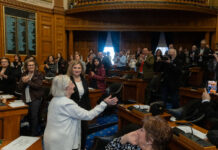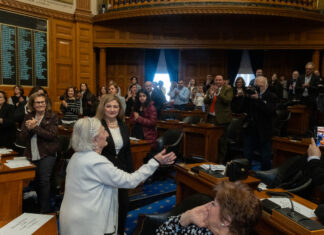By Florence Avakian
Special to the Mirror-Spectator
UNITED NATIONS, N.Y. — Possibly speaking for all Genocide victims, a survivor of the Armenian Genocide once said, “I am somebody, but I am nobody.”
On Thursday, April 12, a symposium, titled “Toward Preventing Genocide: Nations Acknowledging their Dark History: Psychosocial, Economic and Cultural Perspectives,” took place at the UN, attended by close to 50 diplomatic, educational and Armenian community members.
The event began with a moment of silence for the victims of all genocides and was opened by Armenia’s Ambassador to the United Nations Garen Nazarian, who reminded the audience that this marked the 62nd anniversary of the UN Human Rights Declaration outlawing genocide. He stated that many countries, as well as scholars, including Turkish intellectuals, have already recognized the Genocide of the Armenians by Ottoman Turkey. He paid tribute to the memory and the 160th birthday of the Norwegian humanitarian Fridtjof Nansen, who “gave support to the fragile fragments of the Genocide,” and issued the Nansen Passport for the stateless Armenian survivors.
Before the program even began, two members of the Turkish Mission to the United Nations unsuccessfully tried to disrupt the event with loud protests, an action they again attempted at the conclusion. Chairperson of the event, Dr. Ani Kalayjian, president of the Association for Trauma Outreach and Prevention (ATOP) and the Armenian-American Society for Studies on Stress and Genocide (AASSSG), did not permit the Turkish outburst to continue.
Harrowing Testimonies
The highlight of the event was the screening of the film, “The River Ran Red,” by the late Dr. Michael Hagopian, whose wife and daughter were present. An account of the Armenian Genocide, the documentary is a compilation of harrowing testimonies and archival photos. “We were lying in blood in a forest. By day, we saw the dead,” said one survivor. “The Turks forced children in a Turkish orphanage to dig up the dead Armenian clerics and urinate on them,” said another, adding, “I saw a hundred children thrown into the Euphrates River so the Turks could spare their bullets.” Babies were buried in the desert with only their heads above ground, which were then crushed under the hooves of running horses, recalled another survivor.
In the film, the missionary, Mary Louise Graffam, reported from Malatya that “the valley was full of corpses.” And US Consul Jesse B. Jackson related seeing 500 emaciated women and children from Sivas after they reached Aleppo, Syria, following a 1,000-mile march. In one of the scenes, a Turk who brought fruit to Fr. Krikor Guerguerian (a.k.a Krieger), asked the Armenian priest for forgiveness for killing the priest’s father and three brothers and confiscating the house’s garden.
His nephew, Dr. Edmund Gergerian, has established the annual Krieger monetary Award for high school and college students who write the best essays on “What the Legacy of Genocide Means to Me.” At the symposium, four high school students who read their writing were honored with the award.
Carla Garabedian, director of the Armenian Film Foundation who received the AASSSG’s 2011 Outstanding Achievement Award, spoke about “future legal proceedings concerning monetary compensation” for the Genocide, a subject of fear for Turkey. “But how do you calculate such a figure. The International Criminal Court should decide the amount,” she said and reported that Turkish historian Taner Akçam and other Turkish scholars have already revealed that “Armenian assets were transferred into private and public hands.” Under international law, there is no statute of limitations on suing for stolen goods, she said, adding that Germany, since 1952 has paid Holocaust victims $60 billion. She concluded by noting that Turkey would benefit by freeing itself of Genocide denial, and save millions, which it currently spends on its denial propaganda. “Turks should know and be able to discuss their own history.”
Evolution of Genocide
Prof. Ervin Staub of the University of Massachusetts focused on the evolution of genocide — “a gradual process, which begins with discrimination and some violence, then results in institutional and people changes, which can be reversed but rarely happens. The passivity by the bystanders encourages violence. It is crucial that bystanders actively resist but it must start early,” he said, adding that genocide takes place in economically and psychologically difficult times. “Turks who were called the ‘sick man of Europe’ were already down, plus Armenians were in the way of Pan Turkism.
“Denial becomes part of the identity of both perpetrators and victims. They see the world as dangerous. What is needed is acknowledgment of the pain and reconciliation,” he said, then advised that Armenians should concentrate on the US denial, because constantly pointing out the Turkish denial does not allow Turkey to acknowledge the crime.
Dr. Dennis Papazian, professor emeritus at the University of Michigan, in a report, concentrated on the “Causes and Cures of Genocide,” which involves the “concept of sovereignty” (complete power over life and death). “Thus, until the signing of the Genocide Convention, the killing of one individual was considered murder and thus punishable by the state, while the killing of thousands and even millions by the state had no name and went unpunished.
“State sovereignty must be limited if we are to end genocide. In modern times, nationalism, pre-nationalism and religious exclusiveness have been some of the drivers of genocide, as well as language, and racism,” he said, adding that “by the time of the Armenian Genocide, the concept of ‘us’ and ‘them’ was developing.”
Calling the 19th century the century of imperialism which “was not so much an economic system inspired by the capitalist, as much as an extension of the medieval concept held by the ruling aristocracies that the more territory owned, the greater the prestige and glory. It was in this lethal environment that the Armenian Genocide occurred.” The Ottoman government “looking for an internal scapegoat to deflect attention from their own military ineptness, turned on the unarmed Armenians,” he added.
In conclusion, Papazian stated that it is “humanism, the understanding that we all — black, white, yellow, rich, poor, educated, uneducated, Armenians, Turks and all others — are actually one people with one destiny on this frail earth which holds the key to ending genocide. Thus, intellectual freedom is an absolute necessity for settling issues like the Armenian Genocide and preventing other such atrocities.”
The co-sponsors of the event included the Permanent Mission of Armenia to the United Nations, ATOP, AASSSG, the Armenian General Benevolent Union, Knights and Daughters of Vartan, Meaningfulworld.com, the Tekeyan Cultural Association, the Armenian Constitutional Rights Protective Centre of Armenia and Voices for Freedom.








